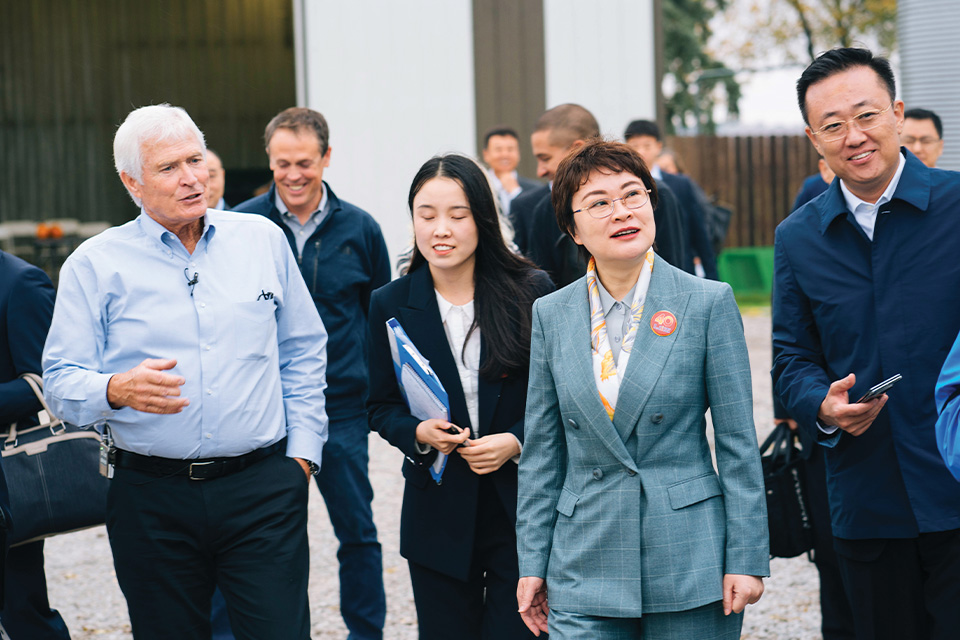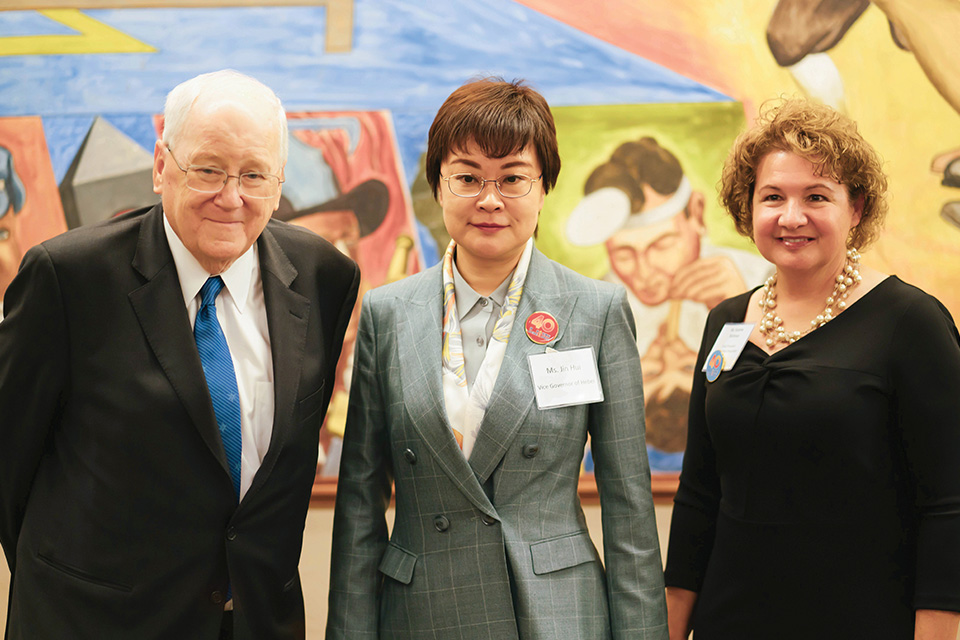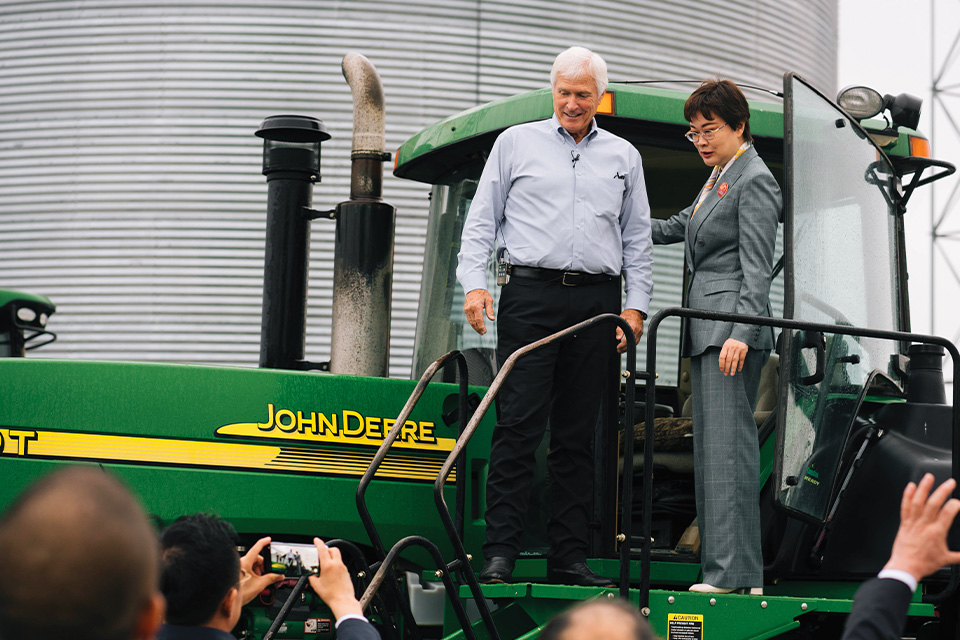
Rick Kimberley and Jin Hui lead an entourage through the Kimberley family farm. (Photo: Iowa Soybean Association / Joseph Hopper)
Building relationships across the Pacific
January 11, 2024
By Jeff Hutton, ISA Senior Writer, and Kriss Nelson, ISA Staff Writer
Soy agreements important for U.S. and Chinese interests
While the geopolitical climate between the United States and China has been strained, the relationship between Iowa’s soybean farmers, agribusinesses and Chinese buyers continues to flourish.
In October 2023, American and Chinese entities signed multiple agreements worth billions of dollars. It also signified continued relationships benefiting soybean producers and Chinese consumers.
During an event at the World Food Prize Hall of Laureates in Des Moines, China’s Hopefull Grain & Oil Group signed two purchase agreements with Archer-Daniels-Midland Co. (ADM) and Olam to purchase $3 billion worth of U.S. soybeans over the next three years.
A delegation of government officials and business leaders led by Hebei Vice Governor Jin Hui and leadership from the Iowa Soybean Association (ISA) witnessed the signing.
China’s soybean imports grew from 20 million metric tons in 2004 to 100 million tons in 2020, with more than 30 million tons sourced from the United States, says Li Chengfeng, vice-general manager of the international business department at Hopefull.
Li says Hopefull’s soybean imports grew 500% — to 5.85 million tons — from 2012 to 2022.
“Of these, 3.06 million tons came from the United States, and one out of every five ships of soybean deliveries comes from Iowa,” he says.
More agreements
Other Chinese agriculture companies and American commodity exporters signed purchasing agreements and contracts at a separate event.
During the U.S.-China Sustainable Agricultural Trade Forum in Des Moines, Chinese companies signed 11 purchase agreements with U.S. exporters.
Among the companies that signed agreements were ADM with Bohi Industry; ADM with China Agri; ADM with Fuzhiyuan Feed Protein (Wilmar International); Bunge with Sinograin Oil; Cargill with Sinograin Oil; CHS with Bohi Enterprises; CHS with Sinograin Oil; COFCO International with China Agri; COFCO Agri with Zennoh Grain; Shenzhen Gem with Hangtung Resources; and Zennoh Grain with Bohi Industry.
The agreements highlight the importance of trade to U.S. soybean producers and consumers around the world.
Consider the following:
- Soybeans and soy products are America’s leading agricultural export with an export value of more than $34.37 billion in 2022.
- ISA increases demand and builds customer preference for U.S. soy globally. ISA partners with the American Soybean Association (ASA) and the U.S. Soybean Export Council (USSEC) to accomplish these goals.
- Every checkoff dollar spent on international marketing generates $17.95 in return value to growers, according to research by Texas A&M University.
- Global soybean demand is up 264% since 1990, due in part by the work of U.S. soybean organizations and international marketing export programs over the past 30 years.
Beyond financial
While the bottom line will always be important to both exporters and importers, the agreements between the Chinese and American soybean producers and businesses reinforces the need for strong relationships.
“Just remember these three words: Peace through agriculture.”
That was the message from Kenneth Quinn, the president emeritus of the World Food Prize Foundation, who was among the many dignitaries to attend the signing event, co-organized by ISA, USSEC, the U.S. Grains Council, and the China Chamber of Commerce for Import & Export of Foodstuffs, Native Produce & Animal By-products (CFNA).
Xie Feng, Chinese ambassador to the United States, says the agreements represent immense value between Iowa soybean farmers and the Chinese people.
“People are the foundation of a nation, and food is of paramount importance,” he says. “The China-U.S. agricultural cooperation is a rich land with bright prospects. The contracts signed today are multiple billions in value. Let us sow more seeds of cooperation on the fields of hope.”
The ambassador says Iowans, in particular, represent what is good about America.
“To me, the warm-hearted people of Iowa are the epitome of what America is,” Feng says.
USSEC CEO Jim Sutter says the relationship between China and U.S. soybean producers is one of mutual interest and respect.
“The collaboration between China and U.S. soy continues to deliver food and nutrition security, and economic growth for consumers, companies and producers in China and the U.S.,” Sutter says. “Sustainable agriculture production and trade are impact multipliers. China has been masterful at leveraging trade to achieve local food security and economic growth. We strive to maintain this stable and mutually beneficial collaboration between China and U.S. soy as the ballast for successful bilateral economic and trade relations.”
The U.S. Department of Agriculture’s (USDA) Jason Hafemeister agreed.
“These contracts illustrate the gains from trade: food is moving from areas of surplus to areas of need,” he says. “The confidence behind these contracts allows U.S. producers to invest where we have agriculture advantages, and this relationship will help foster innovation needed to sustainably intensify production to deliver nutrition and food security sustainably.”
Hafemeister, who is the acting deputy undersecretary for USDA trade and agricultural affairs, says despite the current geopolitical climate, both China and the United States have a strong interest in continuing these agricultural relationships.
Trade, he says, has a lasting impact, spurring economic growth, encouraging investment and bringing parties together.
Former ISA board member and current ASA board member Morey Hill from Madrid says these agreements with China expands the global market.
“I think it shows the world that Iowa is ready to do business with China and others to move our products,” he says. “I’ve always said that Iowa farmers can grow soybeans, but sometimes we’re not so good at selling them. This helps push the needle and opens other opportunities for other markets (countries).”
Celebrating a Milestone
The mission of Iowa Sister States is to serve as a catalyst for economic and cultural interests by developing exchange relationships with other countries and carrying them out in Iowa communities and in our partner states.
To help commemorate the 40th anniversary of China’s Hebei Province as an Iowa sister state, a special signing ceremony was held at the World Food Prize Hall of Laureates in October.
Iowa became a sister state with the province in 1983 under thenGov. Terry Branstad.
“Iowa soybean farmers are excited to further our ties,” says Suzanne Shirbroun, ISA president and farmer from Farmersburg in Clayton County. “We look forward to the next 40 years of friendship as we continue to feed and fuel the next generation.”

Iowa Sister States is a non-profit organization that works to build sustainable international partnerships that connect Iowans to the world community.
“The fact that we are here at the World Food Prize and there has been such a tremendous effort on both sides to celebrate the anniversary speaks volumes on how tight this relationship is, how much it has grown, and how important it is,” says Luca Berrone, an Iowa Sister States board member who was instrumental in starting the relationship between Iowa and Hebei in 1983.
The relationship started to lend support, leadership and learning about methods related to growing and processing food and livestock feed.
As part of the Hebei-Iowa Sister State anniversary, Rick and Martha Kimberley, ISA farmer-members from Maxwell hosted the Hebei delegation on their farm.
“Iowa grows a lot of soybeans and the largest market for our soybeans is China,” says Rick. “It all comes to building relationships and building friendships.”
Work done to advance these relationships by ISA and national soybean associations does not go unnoticed by the people of China.
“There is too much rhetoric going around about our relationship with China,” says Berrone. “China is a tremendous market because they want and need our American products, in particular, soybeans. I think U.S. farmers need to also understand these relationships are paramount in the success of selling what they produce.”
The Kimberleys have hosted trade teams from all around the world, including a visit from then Vice President — and now President of the People’s Republic of China — Xi Jinping.
“It helps to open doors, and it comes down to building relationships,” says Kimberley. “With China being the largest buyer of U.S. soybeans, we have to realize we don’t have much control over the political scene, but if we can work with people to help our industry, that is what we are going to do.”
Hebei Vice Governor Jin Hui saw the Kimberley farm firsthand, and even sat in the driver’s seat of the tractor.
“The Kimberley farm is a model for modernized farming in the United States and is a locomotive for driving grain production,” Hui says.
She also acknowledged and thanked the Story County family for their contributions to China and Hebei agriculture.
“I believe this will further strengthen China-U.S. and Hebei-Iowa exchange and cooperation in agriculture,” she says.
“We hope to continue on the path of friendship,” says Kimberley. “This project has allowed us to show sustainable ways of farming, and also build friendships with the people of Hebei.”
Back